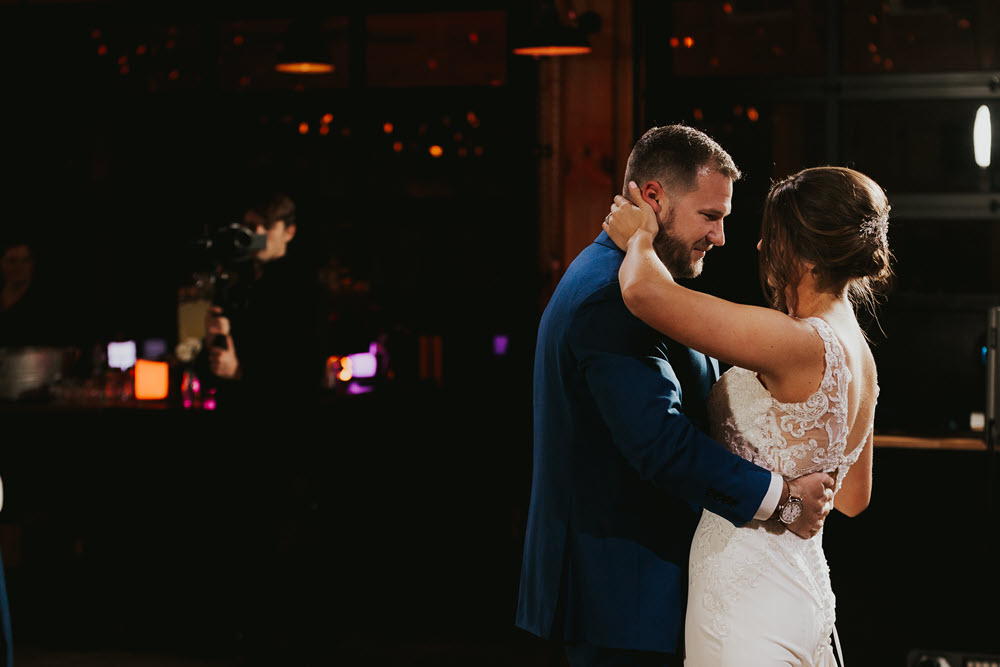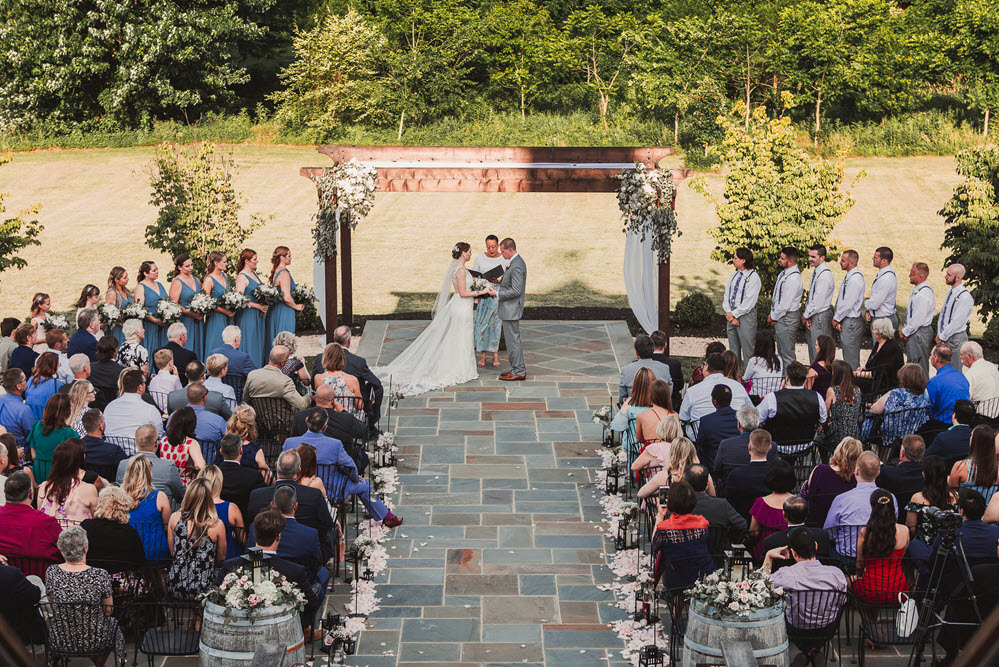By Melanie Walker
Table of Contents
5-minute read
Are you ready to join in wedding planning but need to figure out where you fit?
Curious about how you can make a real impact on your big day without stepping on any toes?
Wedding planning can often leave grooms in a dilemma: how involved should you be? The line between being a supportive partner and overstepping can sometimes seem blurry, leaving many grooms questioning their role. At Zion Springs, we understand the nuances of these challenges. With over 15 years of guiding couples through their wedding planning journey, our expertise shines a light on the path to a celebration that's reflective of both partners.
In this groom's wedding planning guide, we'll show you how to actively participate, from setting budgets to choosing vendors. We'll highlight where your involvement is crucial and offer simple strategies for sharing your ideas and knowing when to compromise. We aim to guide you through these intricacies so you're well-prepared to make decisions that reflect your dreams and identities.
Zion Springs isn't just a witness to the evolution of wedding planning; we're pioneers in adapting it to fit the dynamics of today's couples. Let's explore how to make decisions that celebrate both of you, setting the stage for a perfect wedding day.

The modern groom’s emotional journey in wedding planning
Grooms today are much more involved than just watching from the sidelines. Now, both partners work together to make the wedding show who they are as a couple.
But planning a wedding is more than just picking colors or dishes; it's about going through the ups and downs together. It's okay to feel overwhelmed sometimes. How you both handle these moments matters:
- Talk to each other: Talking about your thoughts and feelings is important. Listening to and supporting each other is critical to making decisions together.
- Take time off: Taking a break is fine if wedding planning gets too much. Doing things you both enjoy can help you remember the excitement of getting married.
- Manage family opinions: Family members sometimes have their own ideas. It's good to listen to them and respectfully share what you both want. Your wedding should reflect what both of you want.
Bringing these personal and emotional parts into your wedding planning can improve the whole process, from setting a budget to choosing vendors and making your guests feel welcome. It all adds up to making your big day smoother and more meaningful.

Enhancing the celebration: collaborative wedding planning
In wedding planning, three key areas demand the groom's attention: budgeting, vendor collaboration, and improving the guest experience; each plays a pivotal role in shaping a memorable wedding.
Wedding budget decisions
Setting a budget is the first step in realizing your wedding vision. Collaborating on this financial blueprint allows you and your partner to prioritize the most critical expenses. For instance, if culinary excellence is your forte, leading the charge on selecting a top-notch caterer can add a personal touch that guests will savor.
- Set priorities together: List your top three wedding must-haves each. This way, the budget aligns with both partners' visions.
- Review finances openly: Being transparent from the start helps set a realistic and manageable budget.
- Allocate tasks based on strengths: If one partner is better at negotiations, they could lead vendor communications, potentially saving money.
A modern groom's responsibilities include actively participating in decisions ensuring a seamless blend of traditions and personal touches.
Groom-inclusive vendor strategies
Choosing your wedding vendors is like building a team that will bring your special day to life. Your role in selecting crucial aspects makes a real difference in how your celebration feels.
- Vendor choices as a team effort: When you both get involved, especially in areas like music and photos, it can truly enhance the overall vibe of your celebration.
- Share the decision-making: Pick vendors that match what you both like. For instance, if you're into music, you could be in charge of finding the DJ or band. Working together like this helps make the wedding a true reflection of both your styles.
- Attend meetings together: Attending vendor meetings means contributing to the decisions, making the process more inclusive and balanced.
- Organize your choices: A shared spreadsheet for vendor details can help you stay informed and aligned on decisions.
Here are some extra tips to make things smoother:
- Know what you want: Think about what's most important to you in a vendor, like their style, how well they communicate, and their prices. This helps you pick the best ones for your wedding.
- Ask the right questions: Asking detailed questions during meetings can give you deeper insights into how vendors approach their work and handle unexpected situations, boosting your confidence in your choices.
- Build good relationships: Effective communication and a positive rapport with your vendors can make planning more enjoyable and productive.
- Review contracts carefully: Understanding vendor agreements is essential to avoid surprises and ensure everything aligns with your expectations.
By following these steps, you'll build a great team of vendors who understand your vision and work well with you, making your wedding day memorable.
Elevating the wedding guest experience
A thoughtfully curated guest list and seating arrangement can transform your wedding atmosphere. Taking an active role in this process, from deciding who makes the guest list to mapping out a seating plan, ensures that your celebration is joyful but comfortable for every attendee, making the day memorable for all the right reasons.
- Map out the guest list together: Discuss and agree on the size of your wedding and the guest list, considering family, friends, and colleagues from both sides.
- Personalize the seating plan: Work together to design a seating plan considering guests' relationships and potential dynamics. A thoughtful arrangement can foster a more enjoyable and social atmosphere.
- Consider guest comforts: Consider small details that can make a big difference in your guests' experience, like transportation options, dietary preferences, and accommodations.
Your contributions are key to a wedding that feels personal and special. Working together on budgeting, vendors, and guest experiences makes the big day truly yours. Up next is advice on the groom’s traditional roles.

Groom’s wedding traditions: actionable advice
In today's weddings, grooms can infuse time-honored traditions with flair, making these moments even more meaningful.
- Groomsmen attire: Pick outfits for your groomsmen that match your wedding, but let them show their style, too. Offer choices in colors or accessories so everyone feels good and fits in with the wedding look.
- Bar selection: Make your reception bar special by choosing drinks you love. Think about adding a cocktail that tells a story about you two. Offer a mix of drinks so all your guests find something they enjoy.
- Honeymoon planning: Plan your honeymoon together, mixing adventure with relaxation. Talk about places you both dream of visiting and plan surprises for each other to make it extra memorable.
- First look or aisle: Decide if you want to see each other for the first time at the aisle or in a private moment before. There's no wrong choice; it's just what feels right for you both.
- Personal vows: Write your vows to express your feelings and promises to each other. Make them personal and sincere, reflecting your love.
- Groom's speech: Your speech is a chance to thank and honor your partner and guests publicly. Keep it heartfelt, focusing on your shared future and appreciation for everyone there.
By reimagining these traditions, you add a layer of personal significance to your wedding. As we conclude, reflect on how these insights lay a foundation for your future together.
From planning to celebration: next steps for couples
Starting this guide, you might have needed clarification about your role in wedding planning. It's common for grooms to wonder how they can help without getting in the way. This feeling points to a significant change from old-school wedding roles to today’s team effort.
You've learned that being a groom is about more than just showing up. You've seen how important it is to be part of planning, making choices together, and supporting each other. This guide has shown you how your contributions are invaluable and essential for a wedding that feels true to both of you.
But don’t stop here. What you’ve learned is just the start of an incredible journey together. The skills and insights gained from wedding planning—teamwork, communication, and compromise—are tools that will serve you well beyond the big day. To continue growing and preparing for your future together, explore more resources from Zion Springs. Whether it's understanding legal rights, selecting the perfect wedding attire, or navigating the challenges of marriage, we’re here to support you every step of the way.

DJ and Corey’s Summer Wedding

Isabel and Gunter’s Winter Wedding

Rachel and Daniel’s Spring Wedding


